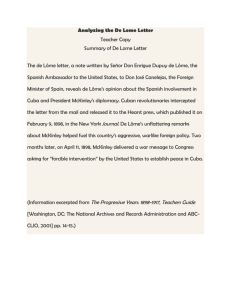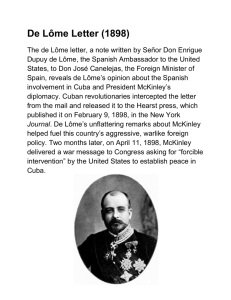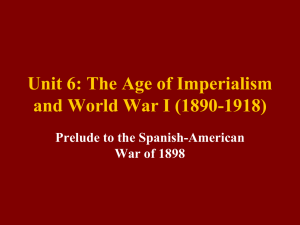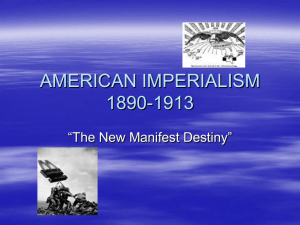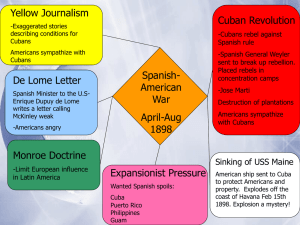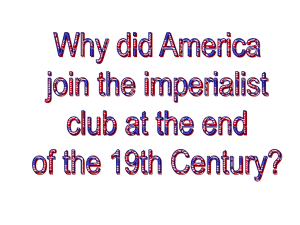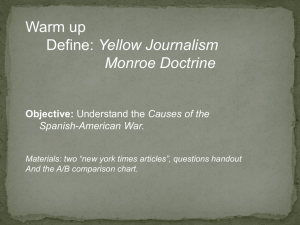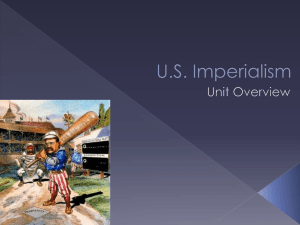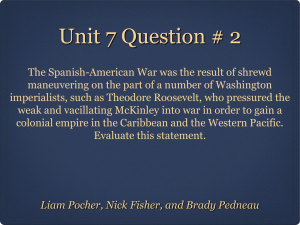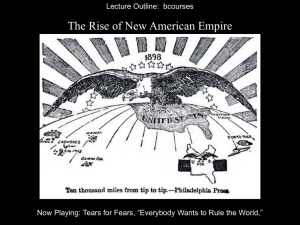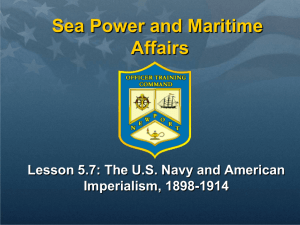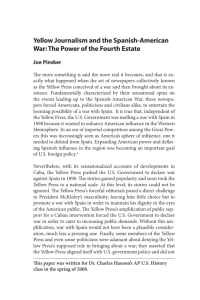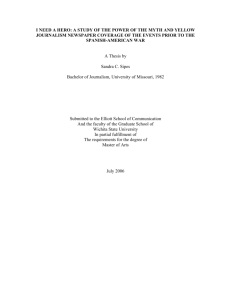US Studies Internal Assessment Packet Summary
advertisement
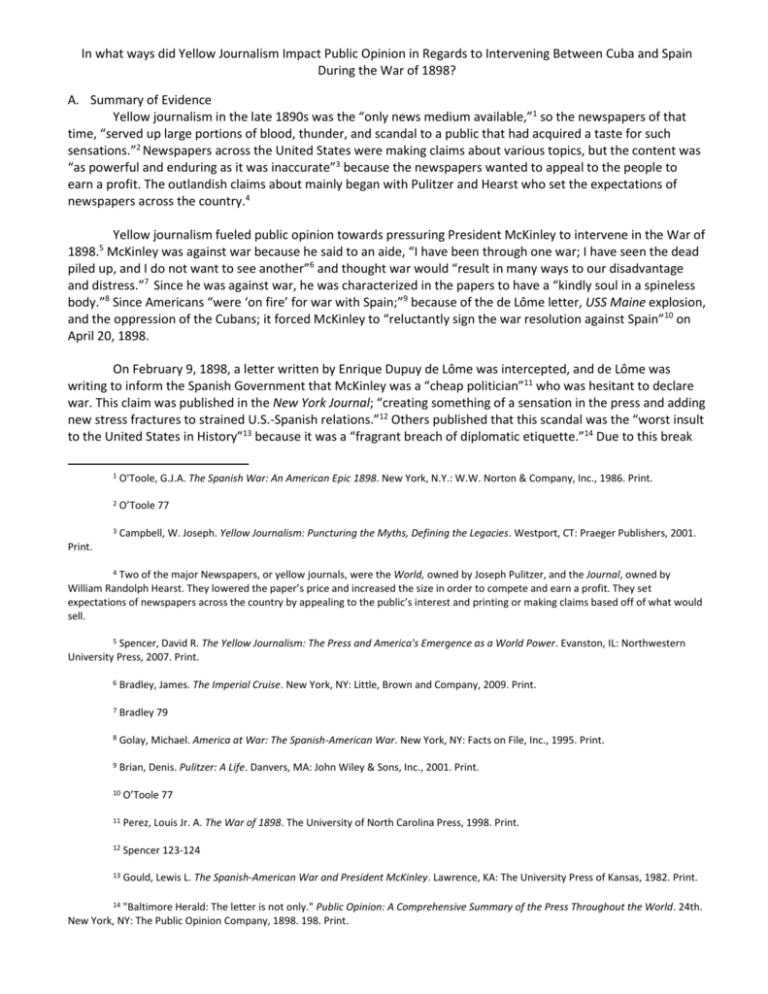
In what ways did Yellow Journalism Impact Public Opinion in Regards to Intervening Between Cuba and Spain During the War of 1898? A. Summary of Evidence Yellow journalism in the late 1890s was the “only news medium available,”1 so the newspapers of that time, “served up large portions of blood, thunder, and scandal to a public that had acquired a taste for such sensations.”2 Newspapers across the United States were making claims about various topics, but the content was “as powerful and enduring as it was inaccurate”3 because the newspapers wanted to appeal to the people to earn a profit. The outlandish claims about mainly began with Pulitzer and Hearst who set the expectations of newspapers across the country.4 Yellow journalism fueled public opinion towards pressuring President McKinley to intervene in the War of 1898. McKinley was against war because he said to an aide, “I have been through one war; I have seen the dead piled up, and I do not want to see another”6 and thought war would “result in many ways to our disadvantage and distress.”7 Since he was against war, he was characterized in the papers to have a “kindly soul in a spineless body.”8 Since Americans “were ‘on fire’ for war with Spain;”9 because of the de Lôme letter, USS Maine explosion, and the oppression of the Cubans; it forced McKinley to “reluctantly sign the war resolution against Spain”10 on April 20, 1898. 5 On February 9, 1898, a letter written by Enrique Dupuy de Lôme was intercepted, and de Lôme was writing to inform the Spanish Government that McKinley was a “cheap politician”11 who was hesitant to declare war. This claim was published in the New York Journal; “creating something of a sensation in the press and adding new stress fractures to strained U.S.-Spanish relations.”12 Others published that this scandal was the “worst insult to the United States in History”13 because it was a “fragrant breach of diplomatic etiquette.”14 Due to this break 1 O'Toole, G.J.A. The Spanish War: An American Epic 1898. New York, N.Y.: W.W. Norton & Company, Inc., 1986. Print. 2 O’Toole 77 3 Campbell, W. Joseph. Yellow Journalism: Puncturing the Myths, Defining the Legacies. Westport, CT: Praeger Publishers, 2001. Print. 4 Two of the major Newspapers, or yellow journals, were the World, owned by Joseph Pulitzer, and the Journal, owned by William Randolph Hearst. They lowered the paper’s price and increased the size in order to compete and earn a profit. They set expectations of newspapers across the country by appealing to the public’s interest and printing or making claims based off of what would sell. 5 Spencer, David R. The Yellow Journalism: The Press and America's Emergence as a World Power. Evanston, IL: Northwestern University Press, 2007. Print. 6 Bradley, James. The Imperial Cruise. New York, NY: Little, Brown and Company, 2009. Print. 7 Bradley 79 8 Golay, Michael. America at War: The Spanish-American War. New York, NY: Facts on File, Inc., 1995. Print. 9 Brian, Denis. Pulitzer: A Life. Danvers, MA: John Wiley & Sons, Inc., 2001. Print. 10 O’Toole 77 11 Perez, Louis Jr. A. The War of 1898. The University of North Carolina Press, 1998. Print. 12 Spencer 123-124 13 Gould, Lewis L. The Spanish-American War and President McKinley. Lawrence, KA: The University Press of Kansas, 1982. Print. 14 "Baltimore Herald: The letter is not only." Public Opinion: A Comprehensive Summary of the Press Throughout the World. 24th. New York, NY: The Public Opinion Company, 1898. 198. Print. In what ways did Yellow Journalism Impact Public Opinion in Regards to Intervening Between Cuba and Spain During the War of 1898? of diplomatic decency, the Hartford Press printed, “Congress will undoubtedly make use of this sensational turn thus given to Cuban affairs to stir up the whole subject afresh.”15 This statement means the de Lôme letter incident revived the issue of how to resolve the conflict between Spain and Cuba. Six days after the de Lôme letter incident, the USS Maine exploded16 which caused more “sensational claims.” A slogan rapidly spread throughout the country, “Remember the Maine, to Hell with Spain!”18 There was no specific evidence proving Spain blew up the USS Maine, but Theodore Roosevelt19 used yellow journalism as a tool because he “wanted war.”20 Roosevelt helped “Hearst create the idea in American minds it ‘was the work of an enemy;’”21 Soon newspapers across the country were claiming “the explosion which destroyed the Maine was the result of the cowardly Spanish conspiracy.”22 They claimed “nothing but a mine or torpedo of the largest size could have wrought such destruction.”23 17 While the de Lôme letter and USS Maine incident occurred, the oppression of the Cuban people was simultaneously being depicted through political cartoons, like an “etching from Pulitzer’s New York World shows an unbelievably hateful looking man representing Spain and a starved woman representing Cuba” (See Appendix A).24 Others claimed, “The people of Cuba were all and most kindly disposed toward the United States and looked upon this country as a big brother”25 and “screamed that a quarter of the (Cuban) population was dead and the rest suffering acutely.”26 Advertising occurred where organizations were informing and asking US Citizens to help with relief funds which would be sent to the oppressed Cubans.27 15 "Hartford Press: Congress will undoubtedly." Public Opinion: A Comprehensive Summary of the Press Throughout the World. 24th. New York, NY: The Public Opinion Company, 1898. 198. Print. 16 The USS Maine was anchored in the Havana Harbor to oversee the fighting between the Cubans and Spanish. This was President McKinley’s way of honoring the Monroe Doctrine while not getting directly involved in the war. However this attempt to only advise the war was unsuccessful. 17 Campbell 97 18 Somerlott, Robert. The Spanish-American War: "Remember the Maine!". Berkley Heights, NJ: Enslow Publishers, Inc., 2002. 19 Theodore Roosevelt was the Assistant Secretary to the Navy 20 Bradley 79 Print. 21 Roosevelt and Hearst’s relationship was based off of both of them receiving what they wanted by manipulating public opinion. Roosevelt knew that public opinion would be furious with the claim that the Spanish was the cause, and Hearst knew that Roosevelt’s claim would sell the most copies that day because no other paper had the right to these claims. 22 Golay 13-14 23 "No Maine Indemnity, No War." Salt Lake Herald [Salt Lake City, UT] 27 Mar. 1898: Library of Congress. Web. 8 Mar. 2010. <http://chroniclingamerica.loc.gov/lccn/sn85058130/1898-03-27/ed-1/seq-1/%3Bwords%3D/>. 24 Dolan, Edward F. The Spanish-American War. Brookfield, CT: The Millbrook Press, Inc., 2001. Print. 25 Spencer 123-124 26"William McKinley." About the White House: Presidents. The White House, n.d. Web. 20 Feb. 2010. <http://www.whitehouse.gov/about/presidents/williammckinley>. 27 "Relief for the Starving Cubans." The San Fransisco Call [San Fransisco, CA] 21 Mar. 1898: Library of Congress. Web. 8 Mar. 2010. <http://chroniclingamerica.loc.gov/lccn/sn85066387/1898-03-21/ed-1/seq-1/%3Bwords%3D/>.
